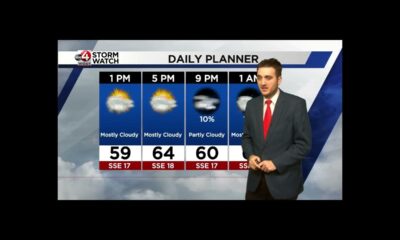News from the South - North Carolina News Feed
5 On Your Side restaurant ratings Saigon Bistro, IHOP, and StarBar
SUMMARY: In 2024, several restaurants received their second B health inspection scores. Zigon Bistro in Fayetteville scored 82, down from previous scores of 90 and 94.5, due to issues like raw meat stored improperly, a malfunctioning dishwasher, and eggs left out too long. IHOP on Capital Boulevard in Raleigh scored 88.5, with problems including employees dropping food without washing hands and debris in clean containers. Finally, The Star Bar in Raleigh scored 88, improving from 85, but faced issues like an insufficiently cold cooler, no soap at the handwashing sink, and raw chicken stored above raw pork, posing cross-contamination risks.

5 On Your Side’s Keely Arthur shows us where in this week’s restaurant ratings.
News from the South - North Carolina News Feed
Raleigh City Council discusses transforming area near Lenovo Center, hears concerns
SUMMARY: Raleigh City Council is considering a major redevelopment project near the Lenovo Center that would create a new sports and entertainment district with high-rise buildings, restaurants, shops, and upgraded arena facilities. The proposal, supported by city leaders and the Carolina Hurricanes—who agreed to stay for 20 more years—has drawn both excitement and concerns. Students and staff from nearby Cardinal Gibbons High School support the project but worry about pedestrian safety and construction impacts. City leaders suggested annual reviews to address ongoing issues. The council postponed rezoning decisions until April 15 to allow for more discussion and public input.

New details are emerging about the bold new development that could transform the area around Raleigh’s Lenovo Center, creating a new entertainment district around the arena in west Raleigh.
More: https://abc11.com/post/raleigh-city-council-will-discuss-future-including-wake-bus-rapid-transit-project-housing-security/16114907/
Download: https://abc11.com/apps/
Like us on Facebook: https://www.facebook.com/ABC11/
Threads: https://www.threads.net/@abc11_wtvd
X: https://x.com/ABC11_WTVD
Instagram: https://www.instagram.com/abc11_wtvd/
TIKTOK: https://www.tiktok.com/@abc11_eyewitnessnews
Subscribe: https://www.youtube.com/c/ABC11-WTVD
News from the South - North Carolina News Feed
Asheville has North Carolina’s worst unemployment rate, state says
Six months later and still out of a job. That’s the reality for nearly 13,000 Asheville residents half a year after Tropical Storm Helene struck Western North Carolina.
In the wake of the historic storm, hundreds of businesses closed. The region’s multibillion dollar tourism sector took a devastating hit. Thousands of people were severed from their jobs. Many have not returned to the workforce.
Asheville, a city of roughly 95,000 people, typically boasts the lowest unemployment rate of North Carolina’s municipalities.
[Subscribe for FREE to Carolina Public Press’ alerts and weekend roundup newsletters]
But not now. Not after Helene.
As of January, the most recent figures available, Asheville had a 6% unemployment rate — the state’s highest — according to the N.C. Department of Commerce.
Clark Duncan, director of the Asheville Chamber of Commerce, calls the ranking a “new and unwelcome accolade.”
Help wanted in Asheville
Rocky Mount and Fayetteville, each hovering around 5% unemployment, are giving Asheville a run for its money.
The capital city of Raleigh is home to North Carolina’s lowest jobless rate at 3.2%.
And statewide, that number is a respectable 4%.
But Asheville’s high rate of unemployment doesn’t necessarily mean there aren’t jobs in the region, according to one expert.
“Buncombe County certainly does not have a jobs problem,” said Andrew Berger-Gross, a senior economist for the N.C. Department of Commerce. “What they have is an unemployment problem. We see employers hiring, but there is a large contingent of workers who have not returned to work.”
First, there is what economists call a “matching problem.” Meaning, the jobs that need to be filled do not match the skills and interests of the unemployed.
There are 20,000 job openings in the region, according to Nathan Ramsey, director of the Mountain Area Workforce Development Board. Sectors like health care and manufacturing are on track for normal hiring numbers. Plus, Helene actually created jobs in certain industries, such as construction and debris removal.
“You may be the best bartender in the world, the best server, the best cook — but does that mean you want to drive an 18-wheeler up mountain roads?,” Ramsey asked. “Does that mean you can do — or want to do — construction? Probably not.”

Second: Just because someone needs a job doesn’t mean they are ready or able to get one.
“It is safe to assume that a lot of those unemployed workers might be facing barriers to re-employment — like losing your home or losing your car,” Berger-Gross explained. “Frankly, some people might still be struggling with the emotional trauma of the hurricane’s destruction.
“A lot of these people may need help putting their lives back together before they are ready to return to the workforce.”
Though unemployment rates rose in Asheville and Buncombe County in winter months, the amount of open positions in the region is a positive sign for an economic rebound, as are increased retail sales and hotel occupancy.
But there are concerns that the state’s disaster unemployment program might not be working as it should.
“I get a lot of emails from folks who are kind of struggling with getting unemployment assistance,” state Sen. Julie Mayfield, D-Buncombe, told Carolina Public Press. “Either they’ve applied for it and they haven’t gotten it or they’ve been turned down because they’re back at work a little bit, but not full time.”
Mayfield is hopeful that tourists will arrive to watch wildflowers bloom across the Appalachians this spring.
But wildfires across Western North Carolina may jeopardize those plans.
Smoke signals
Closed trails and roads, mandatory evacuations and poor air quality have scared off springtime tourists and kept locals from their typical routines.
Adventure tourism businesses in the area aren’t operating, putting tour guides and other personnel out of work, said Brevard Mayor Maureen Copelof. Evacuation orders in her county were lifted early this week, but Brevard’s annual bike race — Assault on the Carolinas — was canceled due to the fires.
While most economic indicators in Western North Carolina have been trending positive, an additional natural disaster, such as these fires, threatens to stall recovery before the region can fully rebound.
There is an emotional impact of the wildfires as well. The din of helicopters above the mountains is a painful reminder of the panic and trauma of Helene. Plus, the downed trees and mangled forest floors from the storm make the blazes worse.
“Some people were really triggered by the fact that there was another threat to their home and their health on the six-month anniversary of Helene,” said Leah Matthews, a UNC-Asheville economics professor. “You have people thinking: ‘I’m just starting to rebuild this house and now I need to evacuate again.’”
In the wake of wildfire and flood, economic recovery in the mountains will require patience and a willingness to adapt. The community is wrestling with fundamental questions about its identity and future.
“The elephant in the room is that the region suffered a historic tragedy, and you can’t push rewind on the VCR of life,” Berger-Gross said. “You can’t go back to a time before the disaster hit — that is why it is a tragedy. All of us are trying to move to a better future for Asheville and for Western North Carolina more broadly. But will things be exactly like they were before the hurricane? No, they can’t be.”
This article first appeared on Carolina Public Press and is republished here under a Creative Commons Attribution-NoDerivatives 4.0 International License.![]()
The post Asheville has North Carolina’s worst unemployment rate, state says appeared first on carolinapublicpress.org
News from the South - North Carolina News Feed
Fixing the DMV: Latest on commissioner search, technology upgrades
SUMMARY: In response to significant issues such as long wait times and appointment shortages, North Carolina’s DMV is seeking improvements by partnering with Arizona, which ranks fourth nationally for DMV efficiency. Governor Josh Stein and Transportation Secretary Joey Hopkins highlighted ongoing leadership changes, including the search for a new commissioner after Wayne Goodwin’s departure. Current challenges stem from staffing shortages and outdated technology. Governor Stein’s proposed budget includes funding for over 100 new positions to alleviate these issues. The state plans to adopt Arizona’s software to enhance service efficiency and customer satisfaction, with leadership decisions expected in the coming weeks.

North Carolina is partnering with Arizona to improve its struggling Division of Motor Vehicles, aiming to reduce long wait times and make more appointments available.
-

 Mississippi Today17 hours ago
Mississippi Today17 hours agoPharmacy benefit manager reform likely dead
-

 News from the South - Alabama News Feed6 days ago
News from the South - Alabama News Feed6 days agoSevere storms will impact Alabama this weekend. Damaging winds, hail, and a tornado threat are al…
-

 News from the South - Alabama News Feed5 days ago
News from the South - Alabama News Feed5 days agoUniversity of Alabama student detained by ICE moved to Louisiana
-

 News from the South - Oklahoma News Feed4 days ago
News from the South - Oklahoma News Feed4 days agoTornado watch, severe thunderstorm warnings issued for Oklahoma
-

 News from the South - Louisiana News Feed7 days ago
News from the South - Louisiana News Feed7 days agoSeafood testers find Shreveport restaurants deceiving customers with foreign shrimp
-

 News from the South - West Virginia News Feed7 days ago
News from the South - West Virginia News Feed7 days agoRoane County Schools installing security film on windows to protect students
-

 News from the South - Virginia News Feed5 days ago
News from the South - Virginia News Feed5 days agoYoungkin removes Ellis, appoints Cuccinelli to UVa board | Virginia
-

 News from the South - Florida News Feed6 days ago
News from the South - Florida News Feed6 days agoPeanut farmer wants Florida water agency to swap forest land













































